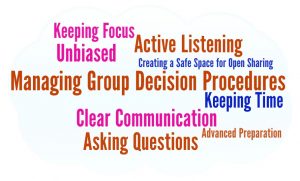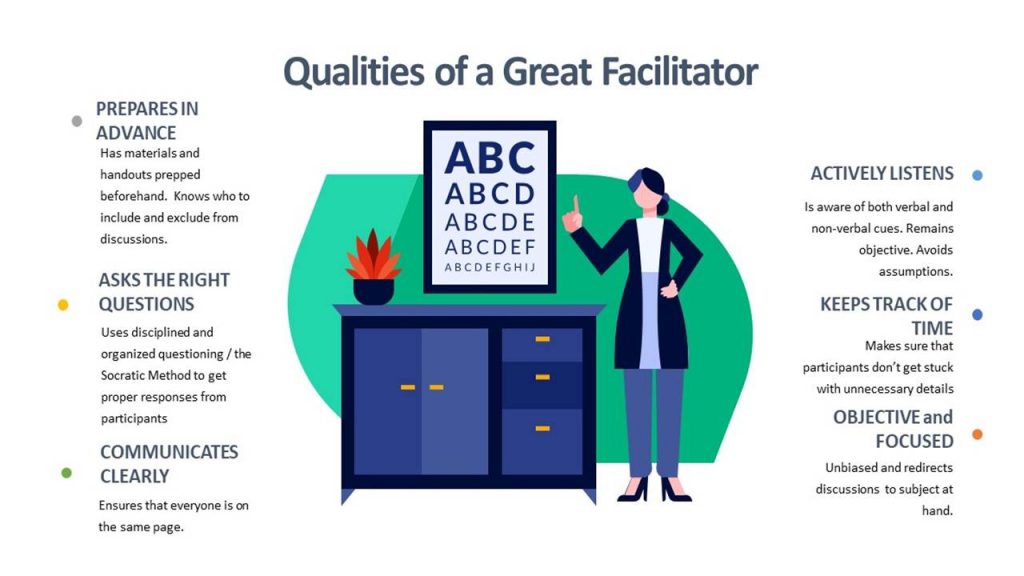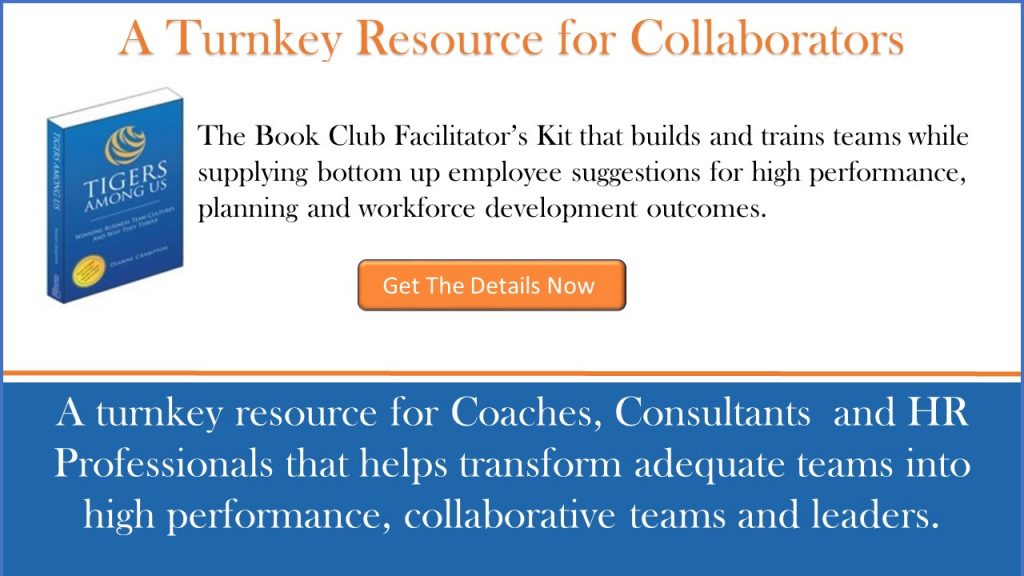 Last week I introduced some of the roles and responsibilities of an effective facilitator. Then we began exploring skills and activities that are required. There are five more skills worth discussing.
Last week I introduced some of the roles and responsibilities of an effective facilitator. Then we began exploring skills and activities that are required. There are five more skills worth discussing.
PROPER TIMEKEEPING
I can’t emphasize this enough. Keeping tabs on the time it takes to accomplish each task, does wonders for the group’s momentum. It also keeps everyone’s attention on what’s important.
A common pitfall for meetings is getting stuck with discussing particulars. People can easily get lost in lengthy debates that either don’t end or end with no resolution. By keeping a close watch on the time spent for each activity, a facilitator can ensure that objectives are met within the given time.
OBJECTIVITY
The unbiased objectivity of a facilitator provides the best opportunity for effective facilitation. This is because when a facilitator is detached from the solution and more focused on how interactions occur, they can observe unspoken concerns.
This is precisely the reason why many organizations engage the services of an outside facilitator when teams are bogged down by an issue. External facilitators and trainers like TIGERS® Licensees can speed things along effectively. Our facilitators are trained to pose questions that reveal assumptions within a team (which a member of your organization might miss).
Facilitation is a skill that comes with experience and preparation. It is best practiced from a place of unbiased curiosity.

MAINTAINING FOCUS
More than laying ground rules for phone and gadget use (and other obvious distractions), creating focus involves constantly providing direction and bringing things back when the discussion has gone off-tangent. Often, participants find it less offensive when the nudge to get back to the topic comes from a facilitator rather than a colleague.
CREATING OPPORTUNITIES FOR EVERYONE TO SPEAK
A facilitator creates a safe space for everyone to voice out concerns. This is a significant element of facilitation.
Effective facilitators accomplish this by familiarizing themselves with the different personality types and the styles that go with them. For instance, members can be classified into introverts, extroverts, traditionalists, etc. Groups are rarely homogenous. Knowing these differences, facilitators must be able to create opportunities for all these types to participate. This could mean “quiet time” before a brainstorming session or maybe asking team members to submit comments in writing before a meeting.
Being aware of personality types and behavior allows quiet individuals to contribute and participate in discussions.
TAKING HOLD OF THE DECISION-MAKING PROCESS
Gathering input from a diverse set of participants leads to more effective ideas. The variety of perspectives simply provides fertile ground for creativity. Facilitators are best able to handle this by managing the decision-making process.
This part is a snare for teams who aren’t able to benefit from the functions of a facilitator.
Facilitators help speed things along by beginning with a shared understanding of what decisions need to be made. Next, a consensus is done. Finally, opportunities are offered for input and evaluation.
Why engage the services of an outside facilitator?
In addition to the objectivity that only an “outsider” can provide, a facilitator trained to spot pressure points (such as personality issues) has always helped speed things along – whether the gathering is for training, mediation, brainstorming, or evaluation.
Many skilled facilitators spend at least three times more hours preparing for a single session. (Teachers and anyone in the academe know this by heart.) They have been taught to structure sessions in such a way that activities appeal to different personalities and even more, different types of learners. The solution could be as simple as having a seating plan where employees are familiarized with members from a different department.
Further, it may very well be that an outsider can help set the proper tone for expected behaviors and attitudes. Tools such as mirroring, tracking, and paraphrasing are tools acquired through training. Mirroring is when a speaker’s words are repeated word for word. Tracking is keeping track of various lines of thought that go on simultaneously. Lastly, paraphrasing is a tool to show the speaker (or group) that their ideas were not just heard, but understood. It involves using words to say what you think the speaker said.
Effective and confident facilitators are trained professionals. They should’ve facilitated many meetings and are most likely proficient with a particular industry or business type. They are comfortable with different facilitation styles and are confident adapting their process to suit your company or team.
One of my non-negotiables when training facilitators is enthusiasm. The best facilitators and team leaders I’ve met through the years are also the most passionate people on the planet. While their objectivity is undeniable, they are also the types who are quick to disarm with their warmth and kindness.
If your organization has needs that you feel are best fulfilled with the services of an outside facilitator, if your team has reached an impasse, or if you want to level up training practices at the workplace, a facilitator trained by TIGERS® can help. Our training and consultation programs are industry-specific and tailored to your work culture. Get in touch with us HERE.
Care to dig deeper into the topic of facilitation?
The following resources deepen this conversation:
- Resources for collaborative leadership, team development and facilitation
- 7 Key Traits of an Excellent Facilitator
- Top 10 Qualities of a Good Planning Facilitator
Copyright TIGES Success Series, Inc. by Dianne Crampton
About TIGERS Success Series
TIGERS provides a comprehensive, multi-pronged and robust system for improving your workforce behavior, work culture, profitability and project management and team leadership success.
 We specialize in building cooperation among employees and collaboration between departments for profitable, agile, and high performance team outcomes. Scaled to grow as your organization and leadership performance improves, our proprietary TIGERS Workforce Behavior Profile, Micro-Training technology and group facilitation methods result in your high performance team outcomes and change management success. We also license and certify elite internal and external consultants and project managers to use our resources for similar outcomes.
We specialize in building cooperation among employees and collaboration between departments for profitable, agile, and high performance team outcomes. Scaled to grow as your organization and leadership performance improves, our proprietary TIGERS Workforce Behavior Profile, Micro-Training technology and group facilitation methods result in your high performance team outcomes and change management success. We also license and certify elite internal and external consultants and project managers to use our resources for similar outcomes.
Here is a complimentary 30 minute webinar on the TIGERS 6 Principles. Course Certificate for Completion.
